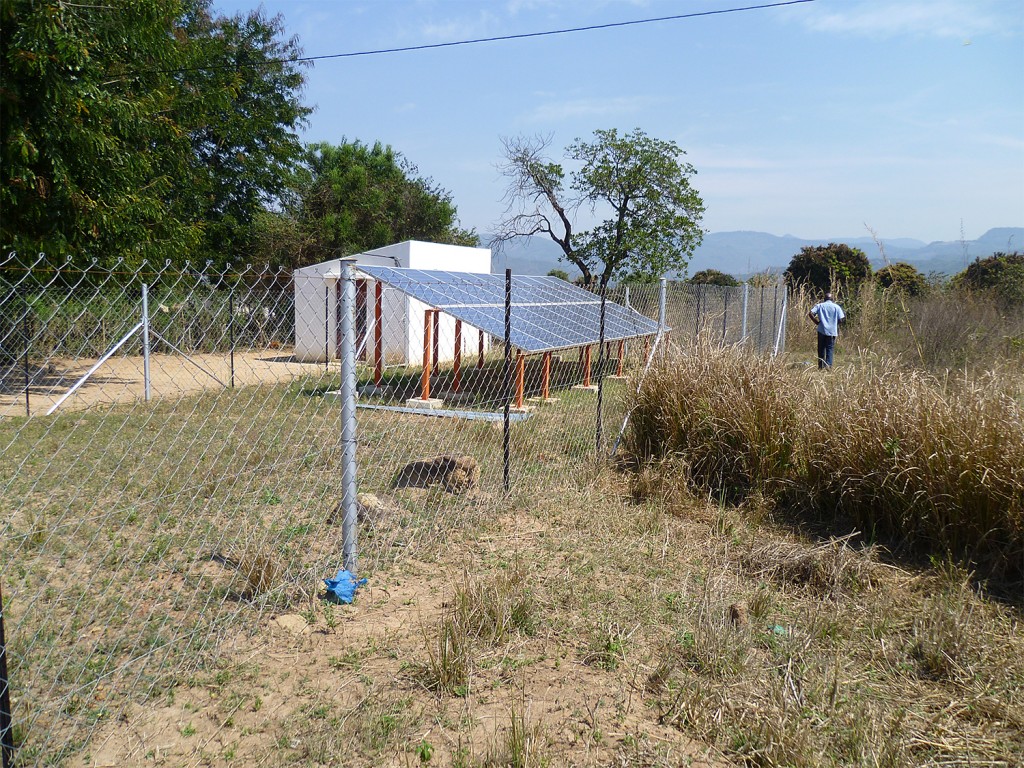The solar mini-grid system in Chinhambuzi
Chinhambuzi
22 August

The Durham-Practical Action team visited the village of Chinhambuzi for several hours while on route from Manica town to Zambezia province. Neto brought a group of student community surveyors here on the same day that we visited a different project in Chua. Neto reported back that it was an interesting project and worth a visit, but that it faces some challenges.
In March 2013, FUNAE inaugurated a solar PV mini-grid with financial support from the Belgium government in the village of Chinhambuzi, in Manica province. The Belgian Technical Cooperation (BTC), which has been cooperating with FUNAE for several years, installed the mini-grid system in Chinhambuzi. The solar mini-grid supplies power to a primary school, clinic, police station, 6 teachers’ residences, the local authority’s residence, and 10 bancas fixtas (small shops). But ordinary residents in the main village (Chinhambuzi sede) and nearby settlements were not connected.
Many residents wish to be connected, but capacity constraints have prevented it so far. The system has only 3.6kWp of capacity, or up to 5 kW, insufficient for linking local households to the network, which extends 3 km. The majority of local households rely on burning wood or charcoal for cooking and heating. The teachers’ houses have two to three lamps and a refrigerator, and electricity is normally provided until about 8:00 PM.
The shopkeepers told us that they pay MT 70 per month (about US$2.50) for electricity, a fee used to support a security guard to watch over the system at night. The tariff appears symbolic and does not cover operations and maintenance costs. Payments are made to the village chief (chefe do posto). Later, we wondered if the chief gives all of the money to the security guard. Meanwhile, the teachers and local authority’s staff choose not to pay any tariff for their electricity, while the shopkeepers’ usage is unmetered.
Given their lack of access, some residents might try to connect in an improvised manner, or illegally, causing stress to the system and outages for shopkeepers, who use large deep freezers that require lots of power. The load will likely increase, as shopkeepers acquire TVs, stoves and other appliances. The system is managed in the provincial capital, Chimoio; there is no means to locally monitor the system’s capacity for community energy planning. Despite these challenges, it was still quite pleasurable to purchase a few chilled bottles of coke from a shopkeeper. Themba interviewed the shopkeeper in Shona.
Our research points to the importance of conducting preliminary market research and needs assessments, which appear lacking in many of the projects we visited. The local demand for solar energy in Chinhambuzi clearly outpaces the system’s capacity, and the mini-grid system is unlikely to accommodate future growth.
Later, while driving to Quelimane, I asked Neto about the lack of village cooperatives as an ownership structure in Mozambique. He said that cooperatives are unpopular in Mozambique, given histories of forced collectivisation during Frelimo’s Marxist-Leninist period in the late 1970s and early 1980s. Mozambicans often have negative memories associated with cooperatives, Neto said. “No one trusts that now. If you come to a community and start talking about that, people will say ‘thank you, see you later.’ The experience in the past has destroyed this kind of thing.”